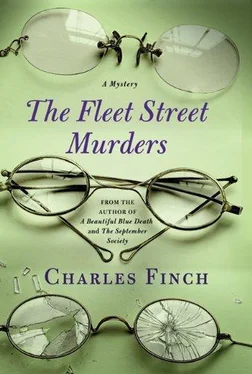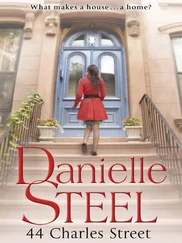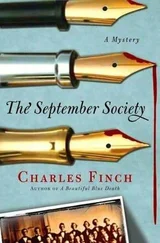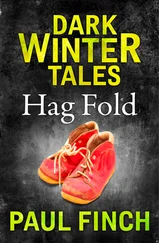Charles Finch - Fleet Street murders
Здесь есть возможность читать онлайн «Charles Finch - Fleet Street murders» весь текст электронной книги совершенно бесплатно (целиком полную версию без сокращений). В некоторых случаях можно слушать аудио, скачать через торрент в формате fb2 и присутствует краткое содержание. Жанр: Исторический детектив, на английском языке. Описание произведения, (предисловие) а так же отзывы посетителей доступны на портале библиотеки ЛибКат.
- Название:Fleet Street murders
- Автор:
- Жанр:
- Год:неизвестен
- ISBN:нет данных
- Рейтинг книги:5 / 5. Голосов: 1
-
Избранное:Добавить в избранное
- Отзывы:
-
Ваша оценка:
- 100
- 1
- 2
- 3
- 4
- 5
Fleet Street murders: краткое содержание, описание и аннотация
Предлагаем к чтению аннотацию, описание, краткое содержание или предисловие (зависит от того, что написал сам автор книги «Fleet Street murders»). Если вы не нашли необходимую информацию о книге — напишите в комментариях, мы постараемся отыскать её.
Fleet Street murders — читать онлайн бесплатно полную книгу (весь текст) целиком
Ниже представлен текст книги, разбитый по страницам. Система сохранения места последней прочитанной страницы, позволяет с удобством читать онлайн бесплатно книгу «Fleet Street murders», без необходимости каждый раз заново искать на чём Вы остановились. Поставьте закладку, и сможете в любой момент перейти на страницу, на которой закончили чтение.
Интервал:
Закладка:
“I should hate to give up my morning room, and you your library,” she said.
“Well-compromise is a necessity, I suppose,” he said, feeling uneasily that she was about to suggest they live separately. It was a very faint agony, love. He thought of that old line: Ever till now/When men were fond, I smil’d, and wonder’d how.
She put his mind at ease, however, with her proposition. “What I thought was-well, that we might join our two houses together, Charles.”
“Physically? Knock down the walls?”
“Yes, exactly-or at least, one wall in each floor. We wouldn’t want to knock down the wall between your library and that coat-room I have, but-for instance-we could make a very large bedroom on the second floor?”
Lenox smiled. “I think it’s a wonderful idea,” he said. “It will be a union of minds and a union of houses, eh?”
Jane laughed, and they spent the rest of supper excitedly talking about their new plans.
It was a respite to see his betrothed, but by the next morning his mind was again fixed on George Barnard. He decided to go see Jenkins at Scotland Yard and have a talk with him about it all.
Jenkins would be the third person Lenox took into his confidence on the subject of George Barnard, after McConnell and Dallington, when previously only he and Graham had known. Part of him doubted the wisdom of this, but another part of him was glad that he could unburden himself of this obsession that had so weighed on his spirit.
He sent back word for Jenkins through the long corridors of Scotland Yard, and soon the young inspector came to fetch him.
“How is the mood here?” asked Lenox. “About Exeter?”
“Nine parts frantic for every part sad. Everyone down to the lad selling newspapers is half mad trying to figure it out. It’s an intolerable state of affairs-doing more harm than good, I reckon. Speaking of which, did you visit Carruthers’s rooms, as we discussed?”
“Yes, I did, as a matter of fact. It’s why I came to speak to you.”
“Oh?”
Lenox then explained the entire convoluted history of his suspicion of Barnard; he tried to be concise and complete but found himself rambling slightly. He could see the doubt on his interlocutor’s face.
Jenkins sighed heavily when Lenox had finished. “George Barnard?” he said at length, rather quizzically. “Why are you telling me this theory?”
“At some moment, now or in the future, I may ask you to arrest him. I hope that you’ll do so without hesitation and let the explanations come after. Our window of opportunity may be small indeed, when we find it.”
“He’s a public figure, Lenox.”
“So was Attila the Hun.”
Jenkins laughed. “You’ve rarely led me astray, of course, but-well, here’s one thing-why Smalls? We’ve got such a plausible link between Smalls and Poole. Doesn’t it seem more likely that it was a straight transaction between them than… well, than what?”
“After all, don’t you see-it would have been so foolish for Poole to kill both Carruthers and Pierce, two men who were eternally linked by nothing except his father!”
“That does strike me as your most probable argument,” said Jenkins, “but then why would Smalls willingly kill Simon Pierce?”
Here was a question that he could answer, thankfully. “The Hammer Gang,” he said. “As I said, they’re linked to Barnard. It was to frame Poole.”
“Smalls hadn’t a Hammer Gang tattoo, I’m sure of that. The hammer above the eyebrow-ugly thing.”
“I think Barnard may have recruited somebody new to the gang, in an effort to be particularly careful. Smalls didn’t have a tattoo”-here Lenox paused to explain the words No green -“and he was ultimately disposable.”
“Who do you think killed him?”
Lenox shrugged. “At any time there are half a dozen of the Hammers floating in and out of Newgate-one of them would have done it, I imagine.”
“Very tidily, too,” said Jenkins skeptically.
“I’m sure the idea was Barnard’s. If only we could find his liaison within the gang-for it’s surely impossible that he knows more than one or two of them.”
“Smalls, then? Just did it for money? Or to be initiated?”
“Both, to be sure. There was something else as well.”
“Yes?”
“Mrs. Smalls told me that she was only months away from debtors’ prison. A hundred-pound debt, which she could never have paid, and Hiram wiped it clear in one moment. That’s what she said. Barnard must have used Smalls’s mother as leverage over the man.”
“Yes,” said Jenkins thoughtfully.
“Hence the cryptic clues-the note, the stack of coins,” said Lenox. “If he came right out and said anything that might save his skin, his mother would go straight to prison. The clues were a kind of insurance.”
“It hangs together, I suppose,” said Jenkins, “but most importantly, Lenox, I don’t understand what Barnard’s motive for all this mayhem might have been.”
Lenox had been afraid of having to address this. “I’m not entirely sure, to be honest. In general I believe it’s because Barnard’s whole criminal career was somehow in danger of being exposed. I think Carruthers may have been blackmailing Barnard. He wrote an article about the Mint, which I just read again-it doesn’t contain any revelations, but Carruthers might have found something.”
Jenkins looked skeptical. “That’s all? What about Exeter? Pierce?”
“Pierce was cover, I told you, a red herring. Carruthers was the true target.”
“If only there was any proof beyond your word.”
Lenox pulled his valise onto his lap. “Here are the newspaper articles Carruthers kept about G. Farmer. Read over them?”
“Certainly.”
“Look, more importantly,” he said, handing the younger man a sheet of paper, “here’s the dossier I put together.”
Jenkins studied it. Halfway down the page, he said in a quiet sort of yelp, “My God! Half of the unsolved crimes in our files are on this sheet of paper!”
“I know.”
“He must be ungodly rich.”
“You were at his house, before Exeter replaced you on that case,” said Lenox.
Jenkins looked up sharply. “There’s the question, I suppose. Why did he kill Exeter?”
Ruefully Lenox shook his head. “I wish I knew.”
CHAPTER FORTY-THREE
The case went slowly, very slowly indeed; for two days nothing happened. Lenox passed his hours not in any traditional pursuit of George Barnard but by sitting in the British Library’s Reading Room and going back through old newspapers, reading every article he could find by Winston Carruthers. It was dry work indeed, and worse still it was unproductive. Eventually he gave up.
On the afternoon of the second day he was sitting in his library at home, having a cup of tea and a sandwich, when Dallington arrived at the front door. Graham showed him in.
“I’ve some news,” the young aristocrat said, his face lined with fatigue but also bright with excitement. “It’s about Barnard.”
The butler started for the door.
“Stay, Graham,” said Lenox. “Do you mind?” he asked the lad.
“No-at least-no,” said Dallington, slightly puzzled.
“Graham is my oldest comrade in arms against George Barnard, as I mentioned to you once before.”
“Of course, then.”
“What have you discovered?” asked Lenox.
“Barnard has been emptying his bank accounts.”
There was a moment of silence. “How could you possibly have discovered that?” Lenox asked.
“I went to the banks and looked at Barnard’s accounts, of course.”
Lenox laughed. “How?” he asked.
“I went in to look at my accounts and tipped the teller a few pounds to bring me Barnard’s papers as well as my own. It seems he emptied the two accounts I saw of all his ready money-several hundred pounds-although his investments still deposit there.”
Читать дальшеИнтервал:
Закладка:
Похожие книги на «Fleet Street murders»
Представляем Вашему вниманию похожие книги на «Fleet Street murders» списком для выбора. Мы отобрали схожую по названию и смыслу литературу в надежде предоставить читателям больше вариантов отыскать новые, интересные, ещё непрочитанные произведения.
Обсуждение, отзывы о книге «Fleet Street murders» и просто собственные мнения читателей. Оставьте ваши комментарии, напишите, что Вы думаете о произведении, его смысле или главных героях. Укажите что конкретно понравилось, а что нет, и почему Вы так считаете.












